
Empires of the Middle Ages, subtitled "A Dynamic Simulation of Medieval Europe, 771–1467", is a historical board game published by Simulations Publications, Inc. (SPI) in 1980 that simulates grand strategy and diplomacy in the Middle Ages.

Empires of the Middle Ages, subtitled "A Dynamic Simulation of Medieval Europe, 771–1467", is a historical board game published by Simulations Publications, Inc. (SPI) in 1980 that simulates grand strategy and diplomacy in the Middle Ages.
Empires of the Middle Ages is a board game for 2–6 players, each of whom controls an empire in medieval Europe between 771 and 1467. Each empire is composed of various areas that are rated for wealth, religion, language and population.
The SPI edition game box holds:
The object of the game is to create and grow an empire in terms of wealth, geography and stability. [1]
Each Round represents five years of game time. To begin a round, the Year cards are shuffled, and each player receives five facedown. Players are not allowed to look at them. Player order for the Round is determined by leader stature rating and number of areas controlled, with the highest rated player choosing when they wish to play during that Round (first, second, last, etc.). Once a player order has been determined, the active player
Once all player have had a turn, the next Round is played. [1]
Five Rounds (representing 25 years of game time) is a Game Turn. [1]
A number of short scenarios (ranging from four to eight Game Turns equalling one to two centuries) are included as a means to learn the rules. Once players are familiar with the rules, they can play the entire campaign from the year 770 (the accession of Charlemagne) to 1475. [1]
Empires of the Middle Ages was designed by James Dunnigan and developed by Anthony F. Buccini and Redmond A. Simonsen. Simonsen also developed the graphic design of the game. [2]
Dunnigan had originally conceived of it as a computer game, but in 1980, he felt there was not yet a suitable, inexpensive and widely distributed home computer, so his design became a board game. [3]
The game proved popular, and after its release in early 1980, remained near the top of SPI's Top Ten bestseller list for the rest of the year. [4]
SPI published a thematic sequel game of empire building that used a modified set of the same rules, albeit set in a distant future, titled The Sword and the Stars . [5]
After the demise of SPI, Caledon Software Designs created a DOS computer version of the board game for 1–8 players, published in 1994 under the title Rise of the West. [6]
Decision Games acquired the rights to the board game after a revision by Ty Bomba, [7] released a second edition with additional Event cards in 2004. [2]
In Issue 33 of Phoenix , Roger Sandell felt that the main problem of this game was that "it gives little sense of the historical changes taking place in the period it depicts." He also noted that the game didn't "take much account of differing styles of government from country to country." Despite this, Sandell felt that "As a whole the game plays well. It moves reasonably quickly and the eternal problems that beset each nation mean that it is not simply a game of attempting to conquer everything in sight." He did note that there were periods where there was little player interaction. He concluded, "to some extent, an attempt has been made to put too much into one package and one set of rules and that the game might have benefited from attempting to look at a more restricted area, either historically or geographically." [1]
In Issue 23 of Fire & Movement , Rob Land commented, "The game plays well and has been completently play-tested. [It] seems to have something for everyone who ever wanted to act like a king." Land concluded, "It has many good features which you will enjoy discovering yourself. This is the kind of product the hobby expects from SPI: original in conception and workable in execution." [8]
In Issue 54 of Moves , Charles Vasey thought that "The total effect of [the game] is good. It must inevitably fail to simulate so complex a subject as the history of nations, but it comes very close." [9]
In Issue 13 of Paper Wars , Scott McCannell thought that "Aside from the sometimes ambiguous rules, [the game] has few flaws, and the ambiguities are easily corrected by adopting house rules. EotMA has a high replay value." [10]
In Slingshot, John Graham-Leigh reviewed the second edition published by Decision Games, and noted that everything was bigger – the maps, the number of counters, even the number of Event cards. But Graham-Leigh was disappointed with the rulebook, which was simply a reprint of the 1st edition rules with a separate supplement for new rules, leaving old and in some cases superseded rules in place. He called this "a very lazy way to do it, and results in a lot of referring back and forth." However, he concluded that "Overall, the game looks to be a genuine improvement on the original. It will best suit players who have a good deal of patience and a fair amount of time available for playing, plus some knowledge of the history and an ability to laugh at misfortune." [11]
In a retrospective review in Issue 3 of SPI's edition of Simulacrum, John Kula noted that designer Jim Dunnigan had originally conceived of this as a computer game. "This may explain why there is so much detail in the game, inconsequential detail to a computer but mind-numbing detail for humans, especially the first-time players who may not expect it from such an apparently simple game." [3]
Several years later, in Simulacrum #25, Kula wrote a scathing review of the second edition published by Decision Games, saying, "The second edition comes across from beginning to end as an email from Nigeria, nothing more than an attempt to cash in on the financial success of the first edition in the current marketplace, a game unencumbered by any extenuating circumstances. Decision Games could do better than this. Much, much better." [7]
Empires of the Middle Ages was chosen for inclusion in the 2007 book Hobby Games: The 100 Best . Game designer Timothy Brown commented, "The game stands out for its innovative balance of mechanics and graphics, guaranteeing an enjoyable session every time." [12]
At the 1979 Origins Awards, Empires of the Middle Ages won the Charles S. Roberts Award for "Best Pre-20th Century Game of 1980". [13]
Simulations Publications, Inc. (SPI) was an American publisher of board wargames and related magazines, particularly its flagship Strategy & Tactics, in the 1970s and early 1980s. It produced an enormous number of games and introduced innovative practices, changing the course of the wargaming hobby in its bid to take control of the hobby away from then-dominant Avalon Hill. SPI ran out of cash in early 1982 when TSR called in a loan secured by SPI's assets. TSR began selling SPI's inventory in 1982, but later acquired the company's trademarks and copyrights in 1983 and continued a form of the operation until 1987.

Invasion: America, subtitled "Death Throes of the Superpower", is a near-future board wargame published by SPI in 1976 that simulates a hypothetical coordinated attack on North America by various factions.

A board wargame is a wargame with a set playing surface or board, as opposed to being played on a computer or in a more free-form playing area as in miniatures games. The modern, commercial wargaming hobby developed in 1954 following the publication and commercial success of Tactics. The board wargaming hobby continues to enjoy a sizeable following, with a number of game publishers and gaming conventions dedicated to the hobby both in the English-speaking world and further afield.
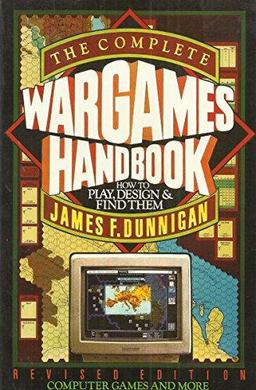
The Complete Wargames Handbook is a book about playing and designing wargames by James F. Dunnigan, published in 1980 by William Morrow and Company.
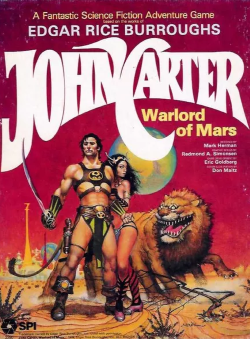
John Carter: Warlord of Mars is a two-player board game published by Simulations Publications, Inc. (SPI) in 1979 that is based on the Barsoom novels of Edgar Rice Burroughs featuring the hero John Carter.
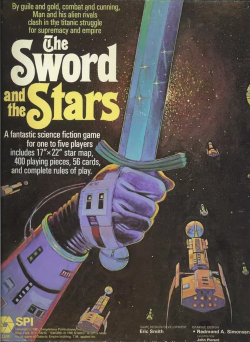
The Sword and the Stars is a science fiction board game of empire building published by Simulations Publications, Inc. (SPI) in 1981 that is based on the rules from the previously published medieval wargame Empires of the Middle Ages (EOTMA).

Marengo: Napoleon in Italy, 14 June 1800 is a board wargame published by Simulations Publications Inc. (SPI) in 1975 as one of four games packaged together in the Napoleon at War "quadrigame". Marengo was also released as a separate game the same year. The game simulates the Battle of Marengo between Austrian and French forces.

MechWar '77, subtitled "Tactical Armored Combat in the 1970s", is a board wargame published by Simulations Publications Inc. (SPI) in 1975 that simulates hypothetical tank combat in the mid-1970s between various adversaries, using the same rules system as the previously published Panzer '44.
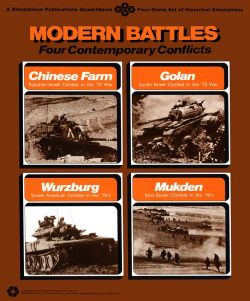
Modern Battles: Four Contemporary Conflicts is a collection of four board wargames published by Simulations Publications Inc. (SPI) in 1975 that simulates four modern-day battles set in the early 1970s.

Napoleon at Waterloo is a board wargame published by Simulations Publications Inc. (SPI) in 1971 that simulates the Battle of Waterloo. The game, which features simple rules, was designed as an introduction to board wargaming, and was given as a free gift with each subscription to SPI's Strategy & Tactics magazine.

Blue & Gray II, subtitled "Four American Civil War Battles", is a collection of four board wargames originally published by Simulations Publications, Inc. (SPI) in 1975 that each simulate a battle from the American Civil War. It is the sequel to Blue & Gray published earlier in the year. Each of the four games was also published as individual "folio games."
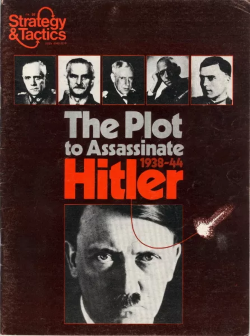
The Plot to Assassinate Hitler is a board game published by Simulations Publications (SPI) in 1976 that simulates the power struggles in Germany's High Command in the latter years of World War II. The game was the second game in SPI's "Power Politics" series, but did not sell as well as the other games in the series – critic Brian Train referred to it as "the ugly duckling."

Bastogne: The Desperate Defense, December 1944 is a board wargame published by Simulations Publications, Inc. (SPI) in 1976 that simulates the German attack on Bastogne during World War II's Battle of the Bulge. The game was originally part of the four-game collection Westwall: Four Battles to Germany, and was also released as a stand-alone "folio" game.
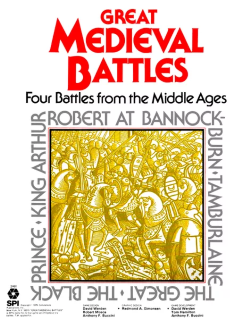
Great Medieval Battles is a collection of 4 board wargames published in 1979 by Simulations Publications Inc. (SPI) that simulates historic battles that were fought during the Medieval period.

War in the Pacific:The Campaign Against Imperial Japan, 1941–45, is a board wargame published by Simulations Publications Inc. (SPI) in 1978 that simulates the Pacific Campaign during World War II. Critics gave the game positive reviews, praising its use of logistics and "fog of war", and its well-written rules.

World War I: 1914–1918 is a board wargame published by Simulations Publications Inc. (SPI) in 1975 that simulates the First World War at a strategic level. Contemporary critics gave the game positive reviews, noting that its ingenious rules, short playing time, and emphasis on resource management made the game highly playable.

Strike Force One, subtitled "The Cold War Heats Up — 1975", is a board wargame published by Simulations Publications Inc. (SPI) during the Cold War in 1975 that simulates a hypothetical clash in West Germany between Soviet Union invaders, and American defenders. The short and simple game was designed as an introduction to the hobby of wargaming, and was given away as a free promotional item.

Russian Civil War 1918–1922 is a board wargame published by Simulations Publications Inc. (SPI) in 1976 that simulates the Russian Civil War. It sold well and remained a popular and sought after game for many years after its publication.
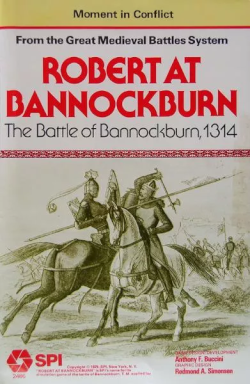
Robert at Bannockburn, subtitled "The Battle of Bannockburn, 1314", is a board wargame published by Simulations Publications Inc. (SPI) in 1979 that simulates the Battle of Bannockburn between armies of the English and the Scottish. The game was originally published as part of Great Medieval Battles, a collection of four games.
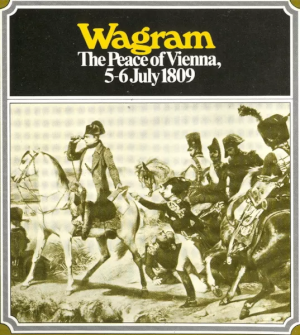
Wagram: The Peace of Vienna, 5–6 July 1809 is a board wargame published by Simulations Publications Inc. (SPI) in 1975 that simulates the Battle of Wagram in July 1809. It was one of four games that were part of the "quadrigame" titled Napoleon at War, but it was also released as an individual game with a set of metal miniatures. Wagram was rated highly in a 1976 poll of favorite wargames, and critics called it the best of the four games in the Napoleon at War box.